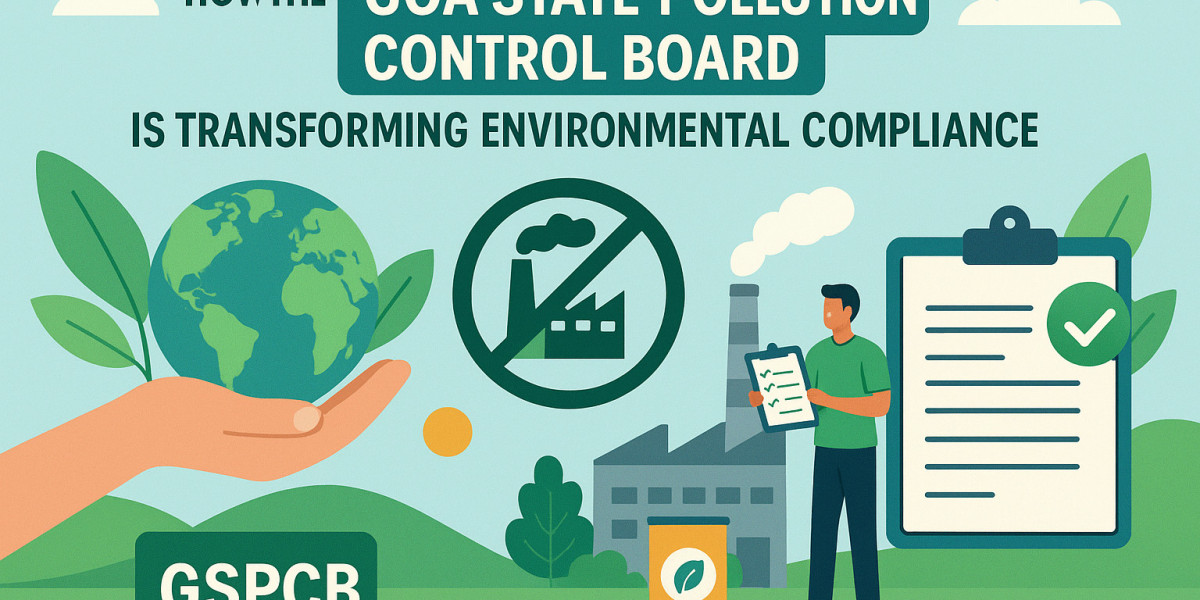How the Goa State Pollution Control Board Is Changing Environmental Compliance
Environmental protection and ecological sustainability have gained momentum in modern governance, especially within ecologically sensitive regions such as Goa. The Goa State Pollution Control Board has been at the forefront of this mission by continuously upgrading its systems, guidelines, and monitoring mechanisms to make sure that industries, businesses, and individuals adhere to environmental laws. From the streamlined process for getting the GSPCB Certificate to digitization of GSPCB registration itself, the Board is playing a vital role in shaping the environmental future of Goa.
In this blog, we explore how the Goa Pollution Board is transforming environmental compliance and what this means to industries operating in the state.
1. Strengthening Environmental Governance
The Goa State Pollution Control Board is the regulatory authority that implements the environmental laws laid down by the Central and State Governments. Traditionally, compliance procedures required immense amounts of paper work, manual inspections, and long waiting periods for approvals. Today, all these procedures have been simplified by the GSPCB with clear guidelines on updated rules and transparent mechanisms.
The Board enforces key environmental regulations, which include:
. Water (Prevention & Control of Pollution) Act
. Air (Prevention & Control of Pollution) Act
. Environment Protection Act
. Hazardous Waste Management Rules
. Biomedical Waste Management Rules
The GSPCB revises standards from time to time and adopts newer technologies to have the industries maintain high environmental performance and minimize pollution.
2. Technology-Driven Compliance and Monitoring
One of the major transformations within the Goa Pollution Board is the adoption of digital platforms. Gone are the days when entrepreneurs had to wait in lines or go through multiple offices for approvals. Today, the Board provides online access to many essential services.
. The digital portal of GSPCB facilitates the following:
. Online application for GSPCB registration
. Electronic submission of all the required documents
. Real-time Application Tracking
. Automated alerts, updates, and compliance reminders
. Online fee payments
. Digital issuance of GSPCB certificates and consents
This has drastically reduced processing times and improved transparency, eradicating delays along the way.
3. Simplified GSPCB Certificate and Consent Process
Industries in Goa must get environmental clearances like:
. Consent to Establish
. Consent to Operate (CTO)
These consents/permissions take the shape of official GSPCB certificates, which are to be obtained for the establishment and operation of any industry/commercial venture.
The Board has standardized its processes so that businesses now have clear guidance on:
. Required documents
. Waste disposal procedures
. Pollution control equipment standards
. Authorized waste handlers
. Reporting requirements
With improved clarity and simplified procedures, businesses can focus on compliance without confusion or guessing.
4. Real-Time Pollution Monitoring Systems
The Goa Pollution Board has set up sophisticated pollution monitoring tools to ensure that the pollution levels do not exceed the tolerant limits. Industries classified in the high-risk or highly polluting category are mandated to install Continuous Emission Monitoring Systems (CEMS) and Continuous Effluent Monitoring Systems (CEMS/CEQMS). These machines collect real-time data on emissions and effluent quality and relay it directly onto GSPCB's servers.
This provides a range of benefits:
. Immediate detection of non-compliance
. Prevention of environmental disasters
. Accurate and tamper-proof data
. Effective long-term planning and policy analysis
The GSPCB enforces upon industries a disciplined approach toward environmental protection through technology-backed monitoring mechanisms.
5. Emphasis on Waste Management and Recycling
The prime challenges in waste management in Goa are tourism, hospitality, pharmaceuticals, and industrial activities. The Goa State Pollution Control Board has introduced stricter rules and frequent inspections to ensure appropriate handling of:
. Hazardous waste
. Biomedical waste
. E-waste
. Plastic waste
. Solid and liquid industrial waste
GSPCB coordinates with the facilities for waste treatment authorized and motivates industries towards the concept of a circular economy. This helps not only reduce pollution but also aids in ensuring resource use is feasible and sustainable.
6. Awareness, Training & Capacity Building
Environmental compliance involves awareness and responsibility as much as rules and penalties. The Goa Pollution Board regularly conducts:
. Training workshops
. Awareness drives
. Industry seminars
. Environmental education programs in schools and colleges
Such initiatives help stakeholders realize the importance of compliance and long-term benefits accruable from protection of the environment in Goa.
7. Transparency, Accountability & Public Participation
Another transformative step that the GSPCB has taken is to encourage public participation. It has made all pollution data, reports, and notices of public hearing available to citizens. This would enable the community to raise objections to any likely environmental impact caused by industries.
Additionally, grievance redressal mechanisms respond to complaints with regard to the following.
. Noise pollution
. Water pollution
. Air quality issues
. Dumping of wastes illegally
This community-inclusive approach makes sure that environmental protection becomes a shared responsibility.
Conclusion
Digitalization, state-of-the-art monitoring systems, increased enforcement, and better public outreach have modernized environment compliance through the Goa State Pollution Control Board. Be it GSPCB registration or obtaining a GSPCB Certificate, or even an understanding of the guidelines relating to pollution, the remodeled system of the Board has made it more hassle-free, efficient, and transparent. With the increased industrial and economic growth of Goa, the role of the GSPCB in safeguarding the state’s natural beauty and ecological balance becomes all the more vital.







